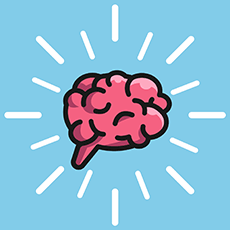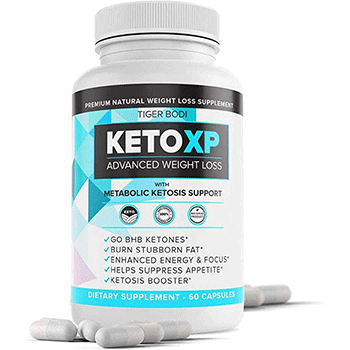Ketosis (physiological ketosis) is a natural metabolic state where your body breaks down fat to produce energy, instead of using glucose for energy. This leads to a high concentration of ketones in the blood.
Don’t confuse physiological ketosis with diabetic ketoacidosis, where both ketones and glucose are elevated.
Ketosis naturally happens there’s limited access to glucose (blood sugar), and fat provides most of the fuel for the body. You generally need to eat less than 50 grams of carbs a day to start ketosis; however this does vary with individuals.
Glucose is the preferred source of energy for the body. It’s also more easily accessible and more available.
A Brief Science Of Ketosis
While you might know the basics of keto, it involves some deep but interesting physiology. Thankfully in this article, you won’t need a PhD in biochemistry to understand its basic fundamentals.
When you eat a low carb diet, the levels of the hormone that breaks down glucose for energy declines.
Fatty acids are then released from fat cells in large quantities, and transported to the liver.
The liver then breaks down these fatty acids to ketone bodies (ketones).
These ketones can provide energy for the body. They can also cross the blood-brain barrier and provide energy for the brain.
 The most abundant (and beneficial) ketone is BHB, that your brain and body can use for fuel. You feel all the amazing benefits of ketosis when your body is making and using BHB.
The most abundant (and beneficial) ketone is BHB, that your brain and body can use for fuel. You feel all the amazing benefits of ketosis when your body is making and using BHB.
Most people agree that burning ketones for energy is a very pleasant experience. Hunger runs in the background instead of the limelight. You can go for hours without thinking about food. This, coupled with steady, increased energy and brain power, makes you unstoppable.
In contrast, when you use carbs for energy, you feel energetic and alert right after you eat, then you crash and get hungry and distracted when you need to replenish.
Key Takeaway:
When your body gets starved of carbs which form glucose, it triggers release of fatty acids from fat deposits in the body. They are then broken down in the liver to form ketones, which are used to produce energy. Your body then gets into ketosis.
The Role Of BHB In Ketosis
BHB (beta-hydroxybutyric acid) is produced through a series of steps in the liver when fatty acids are broken down.
It is the most dominant ketone (about 80%) and the one that’s most readily used for energy during ketosis.
BHB dissolves in water and blood, which makes it easy to transport throughout the body. When you’re deep in ketosis, the steady energy derived from BHB makes you feel unstoppable.
Key Takeaway:
BHB is the most dominant ketone, used to provide energy to the body, including the brain.
Benefits Of Ketosis
Ketosis has a wide variety of benefits:
Healthy Body Composition
Ketogenic diet has been shown to promote a healthy body mass composition in many studies. This leads to a lower body mass index (BMI) – a measure of body fat based on height and weight.
The body is using fat reserves for energy – and you’ll smile every time you step on the scale!
However, it’s widely recognized that adherence to a diet is critical for long-term success. Some individuals may find it easy to adhere to the ketogenic diet, while others may find it unsustainable.
By using fat as a source of energy, ketosis results to a healthy body composition. A healthy body composition is one that includes a lower percentage of body fat and a higher percentage of non-fat mass.
Better mental health
BHB crosses the blood-brain barrier and enhances several processes that promote mental sharpness and alertness.
It can trigger release of neutrophins, which support neuron function and formation of synapses.
Ketosis is also known to reduce age-related cognitive decline. It’s been shown to reverse symptoms of Alzheimers.

Other Benefits Of Ketosis:
- Cleaner Body Fuel: – BHB produces less ROS, some free radicals that can have damaging effects at high levels. BHB also reduces oxidative stress within cells. In a way, having high BHB is like having a “clean-up crew” for your mitochondria.
- Enhances Aging And Longevity: – While this has not been demonstrated in humans, it’s been shown to extend the lifespan of c-elegans worms by up to 20%.
- Reduces Epileptic Seizures: – Ketogenic diets can effectively reduce epileptic seizures, especially in epileptic children who don’t respond to conventional treatment.
- Heart Disease: – Ketosis may improve heart disease risk factors such as blood triglycerides, total cholesterol, and HDL cholesterol.
- Reduces Risk To Type 2 Diabetes: – The diet may improve various risk factors that can lead to type 2 diabetes, including obesity.
- Parkinson’s Disease: – A small study found that symptoms of Parkinson’s disease improved after 28 days on a ketogenic diet.
Key Takeaway:
Keto is HUGE in maintaining a healthy body composition. It also has various benefits such as increased energy, mental alertness, increased cardiovascular health, and preventing several diseases.
4 Simple Ways To Get Into Ketosis Fast
You can get into ketosis through one of several ways:
1: Taking BHB Keto Supplements
One of the fastest ways to get in ketosis is taking supplements. If your blood ketones are above 0.5 mM, you’re in ketosis— regardless of how you got there.
These supplements are usually precursors to ketones, and they provide a way to achieve ketosis even in the absence of a ketogenic diet, carbohydrate restriction, fasting or exercise.
There’s no difference between the ketosis induced exogenously through supplements or endogenously. The BHB and other ketones are not structurally different. It’s just simple biochemistry!
Introducing KETO XP Supplement
- Is formulated with BHB to get your body into ketosis fast and use fat as primary source of energy
- Stops excess fat production
- Suppresses your appetite
- Increases energy levels, improves sleep and prevents fatigue
- The result is lower weight, lower percentage of body fat and a higher percentage of non-fat mass.
2: Intermittent Fasting:
Fasting triggers the body to start breaking down fat for energy. There’s a significant rise in BHB within 12-16 hours of fasting.
Under conditions of “starvation” (6 to 8 days), BHB levels can be as much as 6 to 8 mM
3: Exercise:
Prolonged exercise (especially aerobic exercise in the morning before you eat) is another way to induce physiological ketosis.
This happens because glucose and glycogen are depleted during exercise, fatty acids are released during exercise, and an alteration of hormones that regulate ketogenesis.
4: Ketogenic Diet:
Restricting carbohydrate intake is one of the fastest ways to increase blood ketone levels and induce nutritional ketosis.
This can also be a long-term strategy to maintain ketosis.
Key takeaway:
You can trigger ketosis by cardio exercise, fasting, keto diet (high fat / Low carb), or by taking keto supplements.
GOT QUESTIONS?

Get A Free Expert Consultation
Navigating supplements without professional help can be expensive and dangerous. We are here to help.
There’s no obligation.
Types Of Keto Supplements
There are 3 types of exogenous BHB supplements:
1: MCT Oil
MCT oils (Medium Chain Tryglycerides) don’t contain BHB, but they can raise BHB levels moderately. Coconut oil of a good source of BHB.
2: Ketone Esters:
Ketone esters are more expensive, and contain a ketone molecule bound to a ketone precursor using an ester bond. Deeper and faster ketosis can be obtained from ketone esters.
3: Ketone Salts
Ketone salts consist of a mineral such as sodium or potassium, plus BHB. They’re cost-effective and raise the BHB blood levels rapidly and moderately.
An example is our KETO XP Supplement.
Key Takeaway:
There are various supplements available to trigger ketosis fast. Keto XP is available here in Kenya.
Should You Eat Carbs While You’re In Ketosis?
Our bodies are biologically programmed to burn carbs or fat for energy depending on what’s available.
Carbs supply energy as glucose (blood sugar), or it’s stored in the liver as glycogen. Glycogen is slowly released between meals to keep blood glucose energy levels stable.
Glucose is the body’s preferred source of energy. When you eat carbs, your body starts to burn and store sugar and stops using fat.
So, every time you eat carbs, you slow down fat burning. You have to adjust your diet to physiologically alter the way your body burns fat.
Summary:
Ketosis and ketogenic diet have become a popular way of life, where your body metabolizes fat instead of carbs for energy.
You end up with a healthy body composition, among other major benefits. Supplements can help you trigger and maintain Ketosis.
You can also follow a keto diet, which involves limiting intake of carbs and consuming more fats. The practicality of this can be challenging for some people.
Exercise and fasting can also trigger ketosis.
Got any comments? Please do so below.



